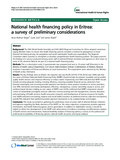| dc.description.abstract | The 58th World Health Assembly and 56th WHO Regional Committee for Africa adopted resolutions urging Member States to ensure that health financing systems included a method for prepayment to foster financial risk sharing among the population and avoid catastrophic health-care expenditure. The Regional Committee asked countries to strengthen or develop comprehensive health financing policies. This paper presents the findings of a survey conducted among senior staff of selected Eritrean ministries and agencies to elicit views on some of the elements likely to be part of a national health financing policy.his is a descriptive study. A questionnaire was prepared and sent to 19 senior staff (Directors) in the
Ministry of Health, Labour Department, Civil Service Administration, Eritrean Confederation of Workers, National
Insurance Corporation of Eritrea and Ministry of Local Government. The respondents were selected by the Ministry
of Health as key informants.The key findings were as follows: the response rate was 84.2% (16/19); 37.5% (6/16) and 18.8% said that the vision of Eritrean National Health Financing Policy (NHFP) should include the phrases‘ equitable and accessible quality health services’ and‘ improve efficiency or reduce waste’respectively; over 68% indicated that NHFP should include securing adequate funding, ensuring efficiency, ensuring equitable financial access, protection from
financial catastrophe, and ensuring provider payment mechanisms create positive incentives to service providers;
over 80% mentioned community participation, efficiency, transparency, country ownership, equity in access, and
evidence-based decision making as core values of NHFP; over 62.5% confirmed that NHFP components should
consist of stewardship (oversight), revenue collection, revenue pooling and risk management, resource allocation
and purchasing of health services, health economics research, and development of human resources for health;
over 68.8% indicated cost-sharing, taxation and social health insurance as preferred revenue collection mechanisms;
and 68.75% indicated their preferred provider payment mechanism to be a global (lump sum) budget.This study succeeded in gathering the preliminary views of senior staff of selected Eritrean ministries and agencies regarding the likely elements of the NHFP, i.e. the vision, objectives, components, provider payment mechanisms, and health financing agency and its governance. In addition to stakeholder surveys, it would be helpful to inform the development of the NHFP with other pieces of evidence, including cost-effectiveness analysis of health services and interventions, financial feasibility analysis of financing options, a survey of the political and professional acceptability of financing options, national health accounts, and equity analyses. | en_US |

